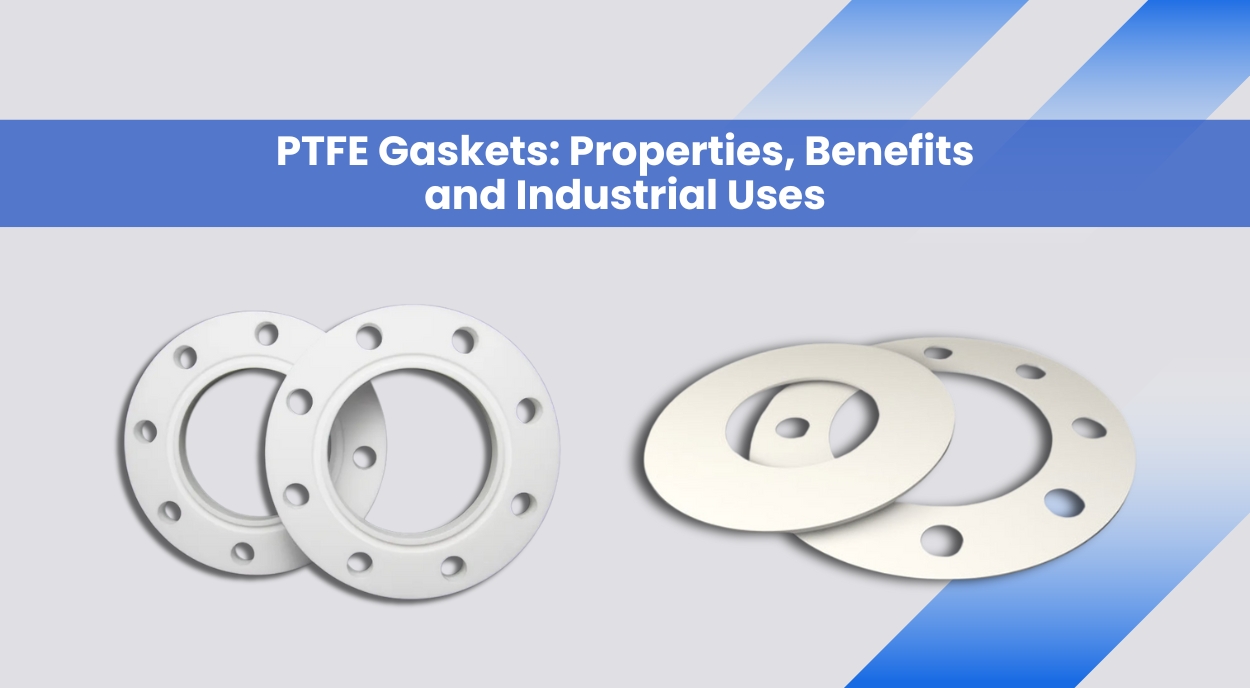PTFE gaskets create a vital barrier for the smooth and safe operation of any machine. You don’t see these gaskets often. They are hidden in many machines, pipelines, and other systems all around. These special gaskets work in industries that deal with heavy chemicals, hot liquids, or gases. They ensure tight containment, preventing any leakage.
Let’s explore PTFE and gaskets. We’ll look at how they work, why industries rely on them, and their main applications. We will look at the benefits and quickly compare this with other gasket materials.
What Is a PTFE Gasket?
PTFE is a type of very slippery plastic that is strong and able to withstand high temperatures and strong chemicals. Perhaps you are more familiar with the brand name of Teflon, so commonly used to design non-stick cookware.
They stop the leaking of fluids between two surfaces: pipe joints or engine parts, for instance. Since PTFE boasts qualities such as chemical inertness and non-degradability, a perfect fit is achieved even for the toughest sealing jobs.
Properties of PTFE Gaskets
- Chemical Resistance: Most chemicals do not produce a reaction with polytetrafluoroethylene. The gaskets maintain their integrity because they do not dissolve or deteriorate when they touch powerful acids, bases, or solvents.
- Low Friction: The surface of PTFE possesses an exceptionally smooth texture which generates a minor coefficient of friction. This characteristic protects equipment from damage and promotes operational smoothness in diverse application scenarios.
- Electrical Insulation: PTFE serves as an outstanding electrical insulator that enables the use of PTFE gaskets in applications needing electrical separation for equipment and systems.
- Non-Stick Surface: The properties of PTFE Gaskets make them perfectly suitable for applications across food pharmaceutical and chemical industries. These gaskets are suitable for use in food-related environments according to their safety profile.
Types of PTFE Gaskets
PTFE gaskets present a range of variants depending on several types of applications:
- Virgin PTFE Gaskets: Made from pure PTFE, these gaskets resist chemicals well. They are ideal for high-purity uses.
- Filled PTFE Gaskets: PTFE combined with fillers like glass or carbon. These fillers boost strength and wear resistance.
- Expanded PTFE Gaskets: This type of PTFE is expanded to form a soft gasket. It seals uneven surfaces effectively.
Benefits of Using PTFE Gaskets
There are several special features of PTFE gaskets; among them are their benefits. While they offer excellent performance, it’s also important to understand the common problems with PTFE gaskets to ensure proper use and long-term reliability. So here are various benefits of using PTFE Gaskets in the industry:
| Benefit | Why It Matters |
| Excellent sealing | Keeps leaks from happening, even with hot or chemical fluids |
| Safe with food & medicine | Can be used where cleanliness and safety are a must |
| Low maintenance | Reduces the need for frequent replacements |
| Saves time and money | Durable gaskets mean less downtime and fewer repairs |
| Eco-friendly choice | PTFE is reusable and lasts long, reducing waste |
| Fits in many machines | Can be cut into any shape or size for different equipment |
Common Industries that Use PTFE Gaskets
In many industries, PTFE gaskets are utilized because they are able to withstand tough working conditions. Let’s explore where they are used:
- Chemical Industry: Where the piping or machinery carries strong acids or bases, the gaskets must not degrade. PTFE can stand even the toughest chemicals.
- Food & Beverage Industry: Being inert and antibacterial, PTFE is considered ideal for equipment sealing in food processing.
- Pharmaceutical Industry: Medicines and drug manufacturing machines need their parts to be clean, safe, and non-reactive. PTFE Gaskets fulfill all these requirements.
- Oil & Gas Industry: This industry tends to use a lot of heavy machinery and strong chemicals. PTFE, with its strength and heat resistance, suits the job well.
- Electronics Industry: Electronic apparatuses need to be kept dry and clean. PTFE does not allow moisture or dust to enter while at the same time not interfering with the operation of the device.
- Water Treatment Plants: Even in systems with salt water or chlorine, the PTFE Gasket will still maintain a stronghold to prevent leaks and consequently last longer than could be expected from rubber-type seals.
Conclusion
In every industry, sealing problems come up, and PTFE Gaskets offer intelligent, safe, and strong solutions for them. From high-temperature steam to corrosive chemicals to food-grade materials, they work on almost any application. These arise out of their chemical resistance, high-temperature capability, and non-stick nature, giving them superiority over rubber and metal gaskets. Any industry in which durable seals are needed should consider PTFE Gaskets as being the best option. Low maintenance and high safety give the user peace of mind and good performance.
Frequently Asked Questions
Absolutely! PTFE gaskets demonstrate extended-lasting performance along with minimal maintenance requirements. These gaskets feature a durable construction that maintains its integrity against wear from both pressure and continuous operation.
The ability to reuse PTFE gaskets varies. Reusing gaskets becomes possible when no deformation occurs and the gasket remains in good condition. Safety-critical systems and those requiring maximum reliability should receive new gaskets for every use.
PTFE gaskets can support high-pressure applications through various thicknesses and types when used in industrial machine applications and pipelines.
The environmental impact of PTFE gaskets receives mixed results. The chemical stability and non-toxicity of PTFE do not make it biodegradable. The stability of PTFE results in minimal environmental impact because it neither releases toxic substances nor breaks down easily during standard operations.



